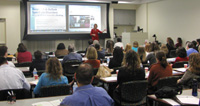|
By Dawn
Brazell
Public Relations
Speaking to a
packed house at the Autism
Spectrum Disorder Scientific
Meeting, keynote speaker Lorri
Shealy Unumb warned researchers
and clinicians that there's a huge
autism tsunami getting ready to
hit the state.
In many ways,
she was preaching to the choir.
 Keynote speaker
Lorri Shealy Unumb of the
advocacy group Autism Speaks
addresses the more than 70
researchers and clinicians
gathered for the Nov. 9 Autism
Spectrum Disorder Scientific
Meeting. Keynote speaker
Lorri Shealy Unumb of the
advocacy group Autism Speaks
addresses the more than 70
researchers and clinicians
gathered for the Nov. 9 Autism
Spectrum Disorder Scientific
Meeting.
MUSC hosted
Nov. 9 the first scientific
meeting of autism researchers in
the state. The meeting, held in
Gazes Auditorium, was sponsored by
the South Carolina Clinical and
Translation Research Institute
(SCTR), the MUSC Autism Strategic
Planning Committee and a grant
from the S.C. Developmental
Disabilities Council.
The meeting,
which included an overview of the
SCTR Pilot Project Program by
Perry Halushka, Ph.D., dean of the
College of Graduate Studies,
featured 17 presentations by
autism researchers from Clemson
University, Furman University,
Greenville Children's Hospital,
Greenwood Genetics Center,
University of South Carolina, and
the departments of pediatrics,
psychiatry and neurosciences at
MUSC.
Unumb, an
attorney and vice president for
state government affairs for the
advocacy group Autism Speaks,
thanked the researchers,
clinicians and advocates in
attendance for helping address the
growing numbers of people affected
by autism. Autism affects one in
110 children and one in 70 boys.
"We need to
educate the medical community. We
still see a lot of pediatricians
who don't know what it is or who
see signs and don't act on it
right away."
Unumb's keynote
address titled "What a Parent
Wants from Autism Research"
praised research efforts being
made, adding that parents
desperately are seeking the most
effective treatments and need a
clear course of action that is not
experimental.
Her son, Ryan,
who is now 10, was diagnosed with
autism at 22 months of age with
medical professionals giving her
no direction about the next best
course of action. "It was
basically, 'Good luck with that.'"
Even today,
many medical professionals are not
comfortable recommending a course
of treatment, with part of that
reluctance based on the
unavailability of insurance
coverage for certain treatments.
"The insurance companies are
waiting to see if the autism
community is ready to fight back,
and right now we're not."
She's working
to change that. Unumb got into the
autism insurance reform movement
as she encountered struggles in
getting treatments funded for
Ryan. She wrote ground-breaking
autism insurance legislation for
South Carolina called "Ryan's Law"
that passed in 2007 and served as
a catalyst for the national
movement toward autism insurance
reform. Legislative advocacy work
by Autism Speaks is making
headway, but there's still
significant resistance from
legislators who don't understand
autism spectrum disorder.
There also is a
need for more research that
provides evidence-based
treatments. Unumb said she can't
overestimate the importance to
parents of research being done. "I
love looking at the agenda and
seeing all the exciting research
you're doing today," she said. "I
implore you to give us studies on
older children and adults, too."
Walter Jenner,
a member of the Autism and
Developmental Disabilities
Monitoring Program with the
division of developmental
pediatrics, said the meeting was a
huge success with organizers
getting a favorable response.
Autism prevalence has increased
rapidly during the last two
decades from one in 1,000 to one
in 100. There is no absolute known
cause although strong evidence
exists for genetic determinants
and possible environmental
triggers, he said.
"This was the
first scientific meeting to gather
South Carolina researchers
together to further research
efforts in autism spectrum
disorders."
At the end of
September, Congress passed the
Combating Autism Reauthorization
Act promising $231 million a year
for the next three years for
autism research, screening,
education and treatment. "The
objective was to stimulate new
collaborative research projects
among clinical and basic science
researchers, other health
professional researchers and the
community that would lead to
productive pre-clinical, clinical
or translational research."
One of the
research presenters, Laura
Arnstein Carpenter, Ph.D.,
associate professor of pediatrics,
said the scientific meeting was an
amazing experience.
"There are so
many interesting research
endeavors related to autism taking
place right here in South
Carolina, from animal research to
clinical trials to epidemiology to
imaging. I really was struck by
the range of activities and by the
expertise of the group as a whole.
This type of meeting is helpful
for connecting basic and clinical
researchers to encourage
meaningful translational
research."
For more
information on Autism Speaks,
visit http://www.autismspeaks.org/.
For more
information on SCTR, visit https://sctr.musc.edu/.
|



 Keynote speaker
Lorri Shealy Unumb of the
advocacy group Autism Speaks
addresses the more than 70
researchers and clinicians
gathered for the Nov. 9 Autism
Spectrum Disorder Scientific
Meeting.
Keynote speaker
Lorri Shealy Unumb of the
advocacy group Autism Speaks
addresses the more than 70
researchers and clinicians
gathered for the Nov. 9 Autism
Spectrum Disorder Scientific
Meeting.